I’m going to recycle a blast from the past: a profile of me by my (by now) old friend Charles Platt, done in Lynchburg, Virginia, 1983. It appeared in The Magazine of Fantasy and Science Fiction, in December, 1984, and by now I don’t think anyone has seen it for thirty-five years. Ideally it should have been included in one of Platt’s two Dream Makers volumes—consisting of profile/interviews with SF writers, but the second volume came out before he interviewed me. In any case, those collections are eminentlly readable. I have some links for them at the end of this post.

[Photo I took of Charles near the beach in San Francisco in Sept, 2012. We were at a Phil Dick conference. In the bright sun, Charles happened to make a temporary hat out of newspaper.]
Profile of Rudy Rucker, by Charles Platt, 1983.
Rudy Rucker, mathematician and science fiction writer, is trying to explain to me his conception of the universe and our place in it, using terms that a layman can understand.
We’re sitting in his office, a disused upstairs room that he rents in a semi-derelict wooden building in Lynchburg, Virginia. An old gray steel desk stands in the center of bare floorboards. A human skull decorates the mantelpiece above a boarded-up fireplace. There are pale rectangles on the walls where pictures used to hang. The remaining furnishings consist of a ragged armchair, a couch upholstered in peeling white vinyl, piles of reference books, and an Escher print.

[The abandoned building where I rented a room as an office, 324 Church St. in Lynchburg, VA.]
Outside, crickets chirp amid a tangled mass of kudzu that has totally engulfed the yard and is working its way across the roof. A freight train clatters by.
Rucker, a genial man with dreamy eyes behind severe rectangular glasses, leans back and rests his bare feet on the desk. His explanation involves infinite-dimensional space, a tough concept to get across to nonscientists. “Life is so full of pain, and suffering, and hatred, and unhappiness,” he begins. He pauses. “At least, my life is. But I find it makes me happy to remember that the universe is a single, organic whole. If you go to infinite-dimensional space, Hilbert space, which I deal with in my novel The Sex Sphere, you can fit it all together. My concept of the universe is that it’s a single pattern in an infinite-dimensional space, and when I’m able to remember this — which is not often enough — I feel very happy and relaxed, because in that sense I’m not cut off in an isolated bag with my own personal problems. I sort of flow out of myself and merge into the reality around me.” He grins and gestures toward the windows, the kudzu, Lynchburg, beyond.
I ask if he’s ever thought of starting a religion. This town is, after all, the home of Jerry Falwell’s Moral Majority. Rucker’s office is, after all, on Church Street.
“I’ve thought of it. In my latest book there’s this character Alvin Bitter, who was also in The Sex Sphere. And he has started a religion, called the Church of Scientific Mysticism. It’s based in Princeton, and the two saints are Albert Einstein and Kurt Gödel. I gave some talks on this; I enjoy talking about it. It always makes me feel happy.”

[God is everywhere.]
Rucker’s several nonfiction books have ambitiously attempted to explain some of the intricacies of space and time, and infinity — itself a slightly mystical, or at least metaphysical, concept. His fiction has tackled similar big topics, less solemnly; White Light, his first published novel, described an afterlife in which infinity was explored like the surface of a science fictional planet.
I ask if there is any kind of afterlife, or higher plane of human consciousness, that he takes seriously.
“I don’t think the individual consciousness survives death. But this is something we don’t have to be so upset about. Instead of going to infinite dimensions, if we just go to a four-dimensional viewpoint, a spacetime viewpoint, the world would be a sort of tangle of atoms, leaving threads, world lines, in a vast tapestry. Surely the fact that the pattern that you call ‘you’ only has a certain size in the tapestry ought to be something you can come to terms with?
“The idea of artistic immortality is important to me. I like to think that years from now, somebody who perhaps resembles me physically or has some of the same interests can read my books and briefly experience the same thoughts. In a sense, that doesn’t do me any good; it depends what you call your ‘self.’ If you choose to identify yourself with the universe, then you’re automatically immortal.”
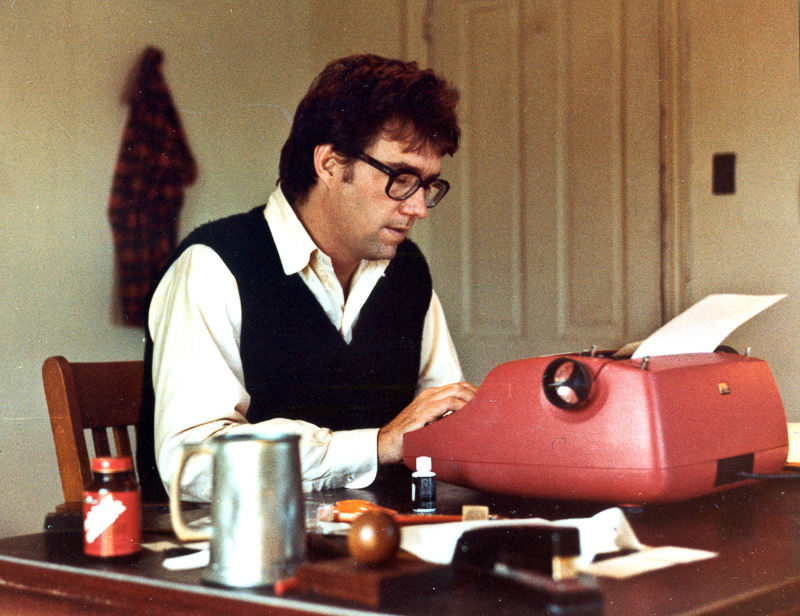
[Me on the path to writing on my “Kerouac scroll,” which eventually appeared as All the Visions.]
I comment that a lot of his work seems to link the largest possible cosmic view with the trivia and tribulations of everyday life.
“I’ve always wanted to bring it all together. It surprises me that more people don’t do it, in fiction or in life. In the sixties, we were all getting stoned and talking about God, and I thought, well, everybody will just keep doing this and we’ll all learn a whole lot about science and it will be real interesting. But then, to me, what I’m doing always seems so reasonable, I’m just surprised that there aren’t more people doing it.
“A lot of mathematicians have extremely limited personalities. They get into mathematics because they can’t speak English, you know? In that movie War Games, I loved the computer nerd with the dark hair. It really reminded me of graduate school.
“I finally developed a disgust for pure mathematics, to some extent, because in so many of the papers that people write, there’s just no way to bring it back and tie it to anything. A really great scientist like Einstein, or Gödel, or Georg Cantor, or Niels Bohr always takes a kind of double-pronged approach: pushing the formalism, the science, as far as they can, but then always trying to bring it back to real life. I think that’s what really good science is all about.”
On a less ambitious level, this is the approach that Rucker takes in his own fiction, which often portrays thoroughly real, everyday people grappling with some farfetched phenomenon of time travel, negative gravity, or inertialess matter, with comic results.

[Embroidered Hungarian heart with one of my painted images of a UFO.]
His characters are usually misfits, out of sync with their surroundings to the extent that they seem totally alienated.
“Well, I’ve always felt alienated myself, all my life. My parents lived in the country, and there were no other children around, so for most of my childhood, I would just go walking around in the fields with my dog, thinking my own thoughts. My family—sometimes I had the feeling they thought I was strange. I don’t know.
“When I went to school, in the fourth grade, I don’t know what I was doing wrong, but they all picked on me, beat me up a lot. That’s why I hate straights so much — still, to this day — because I was picked on by jocks, straight people.
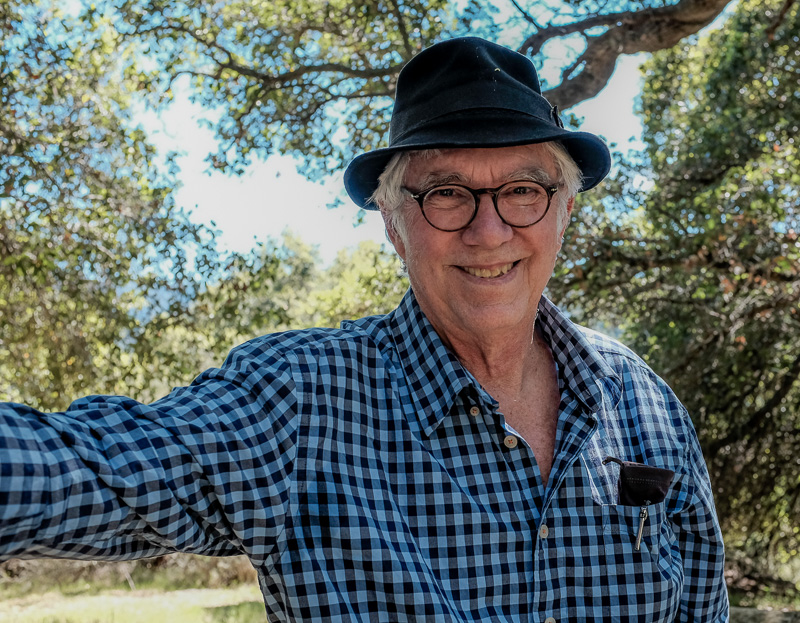
[Now I’m 74. Haven’t changed much. Still punk. But I’ve learned not to be quite so outspoken.]
“Then when I was in the eighth grade, I spent a year in Germany. That was very alienating, too, because I didn’t speak German. But I got to like it, and then I came back to America, and they beat me up some more. All through high school for some reason.” He frowns as if it still seems puzzling and inexplicable. “Maybe I was younger than the people in my class, sort of a wimp? Still, college was nice, because I went to Swarthmore, and it was all smart kids, and everybody there was a wimp, so, I was able to appear fairly hip.
“Another thing contributing to alienation was the whole sixties thing where, over and over, you had old people getting up and saying that all of our beliefs were stupid, and that we were drug addicts, and should be in jail, and — you know, that gets to you.
“I wish I felt less alienated, really. I mean, I live out here in the middle of nowhere; I’ve always lived in the middle of nowhere. Sometimes I wonder what it would be like to be in a city where there are people actively interested in, oh, philosophical issues and things like that.” He pauses, as if trying to imagine it.
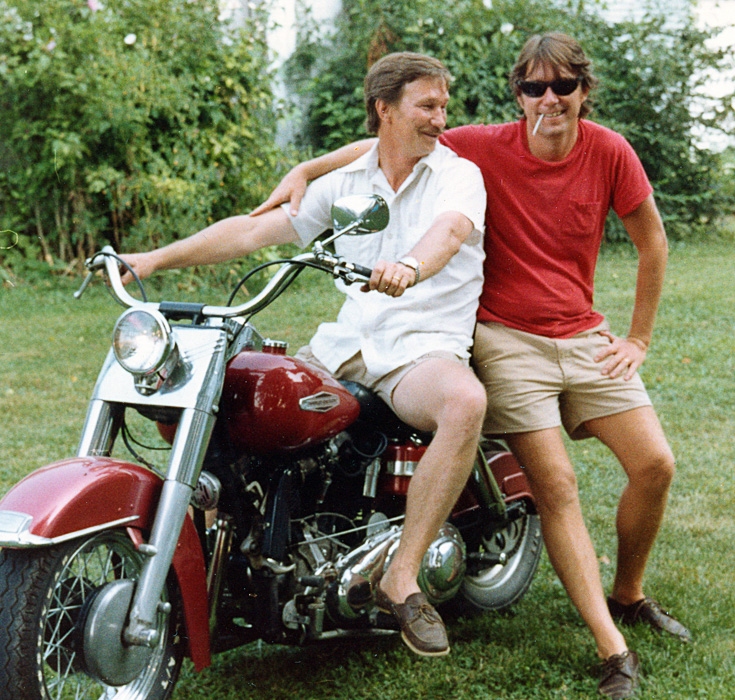
[About to go for ride on my big brother’s motorcycle with him, in Louisville. Skinny cigarette.]
I don’t know Rucker well, but my superficial impression is that he stayed true to some of the rhetoric and styles of the sixties, long after everyone else had gone into regular employment, sold out, overdosed, or settled in suburbia. Rucker himself is thirty-seven and married with three children, but still seems a (short- haired) hippie in his simple love for loud music, loud parties, and the occasional illegal drug. And he still seems to enjoy the radical, adversary spirit of the sixties.
“One way my novels all resemble each other is that there are hard-line terrorist-anarchists in there, and a lot of sex that’s going to outrage people. I do it more or less deliberately to freak people out as much as possible—and then when it’s published I expect everybody to love me for it anyway.
“But they don’t. So, because they’re mean to me, in the next book, I pick on them even more.
“Same thing in my social life, I mean, I’m surprised I still have any friends. Particularly if I’m partying hard, on the weekend, I’ll do some extremely obnoxious things, just to really bug people. Foul language, or tell people the thing that makes them the most nervous, you know? They might be nervous about the police, or about manliness, so I’ll come on like I’m a narcotics agent, or like I’m a sissy, anything that’ll make them as uptight as possible. I don’t know why I do it, really. Well, in a sense, all literature is protest literature.” He pauses. “I heard John Updike say that once; I thought it sounded nice.”

[Two seals rubbing together in Santa Cruz today, May 8, 2020.]
Of course, living in Lynchburg adds to the angst. He moved here, originally, only because he was offered a teaching job at a local college.
“But I lost that, as I had also lost my previous academic job in upstate New York, and that built up a lot of resentment in me, because each time it was a situation where I would have stayed if they had let me. All my colleagues were shocked and outraged, because here I was publishing more than anybody else at the college, but the administrators just said, ‘We can tell what you’re really like, and we don’t want you here.’
“In teaching, there are three things you have to do. First of all, you’re supposed to publish, but a lot of people never do that. Also, you’re supposed to be good at teaching — O.K., well, a lot of people can’t do that too well, either. But maybe the most important thing is what they call ‘collegiality.’ Being willing to sit around the coffee lounge and, you know, talk to people about, oh, getting their cars repaired, or grading term papers—I really hated all that.
“So now I’ve been without a job for two years. It’s nice, but it’s hard to keep coming up with new ideas. In a sense I could write a science fiction book every year, probably. I may indeed end up doing that. But at some point also there’s a feeling that you’re beginning to repeat yourself. If you look at anybody who writes twenty science fiction books, a lot of them are very similar.”
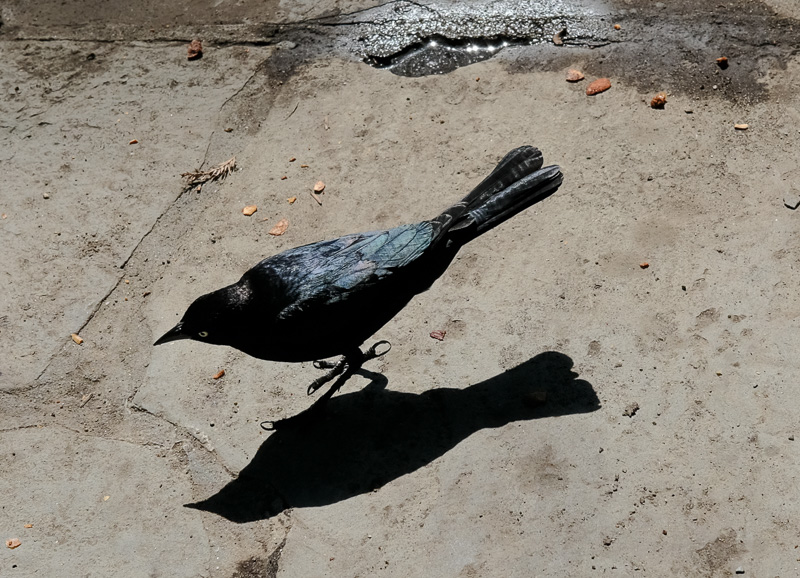
[A bird and his shadow image. Charles and me?]
I ask how he entered the field. He had already published his first nonfiction book, on the fourth dimension. Why did he try writing science fiction?
“I think it was in ’74, the day after seeing the Rolling Stones play in Buffalo. 1 was just so excited, I started a book, which later became Spacetime Donuts. For some reason I wanted it to be an attack on the idea of public safety. I wrote a whole first chapter about that, which I never actually used. I wanted it to be viewed as the first definitive hippie novel, or something like that. I was really out of it. I’d never heard of the ‘new wave’ in science fiction, so I was telling people, ‘This is going to be a new-wave science fiction book.’ And they said, ‘Well, Rudy, that ended like three years ago.’
“I enjoyed underground comix a lot, and I had this idea that all the people who liked underground comix would read my science fiction. Anyway, I sold it to Unearth magazine, and they serialized two parts of it, and I got a hundred dollars, or maybe it was a hundred and twenty, and then they went out of business, and well, that was it. So I was thinking … should I pursue this?

[I found these at a beach…I like to imagine things like this are alive, so I can use them as characters in an SF story.]
“That was when I had to leave my teaching job in upstate New York, and I got a grant to go to Germany. The grant is the one thing that mathematics finally did for me. I’d written a paper called ‘The One-Many Problem in the Foundations of Set Theory,’ and, on the strength of that, I was able to get a grant. I was supposed to do research on different orders of infinity, particularly on Cantor’s continuum problem. That was Mid-Life Crisis, Stage One. I was twenty-six, it seemed I had no future in mathematics, I realized I wasn’t going to solve this problem, because, well, it’s a one-hundred-year-old problem, and it’s very hard.” He laughs.
“So I thought, ‘Here I am in this office, and they don’t really care what I do.’ So I decided to write White Light.”
Rucker sold that novel to Ace Books, who packaged it as a “voices from the afterlife” cultist tract, which may have discouraged some of its potential readers. Ace then published Spacetime Donuts, and thus far has published all of Rucker’s work, including Software and his excellent short-story collection, The 57th Franz Kafka.
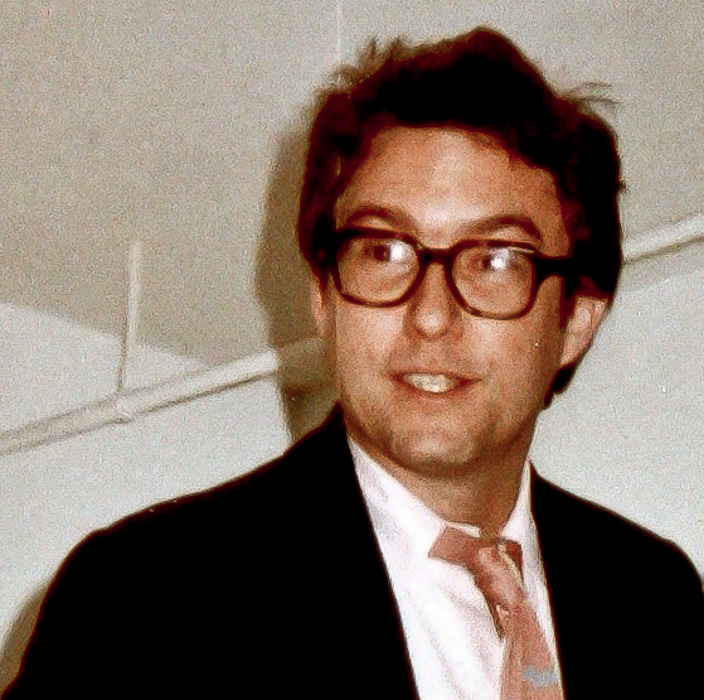
[At my Philip K. Dick award ceremony for Software.]
Many of these stories feature eccentric, low-budget scientists fiddling around in suburban basements, reminiscent of the stories H. G. Wells once wrote about penniless inventors stumbling on antigravity or immortality drugs. I ask if Wells was an influence.
“I read The Seven Novels of H. G. Wells when I was in high school. And I still go back and read him; in fact, he had some very interesting stories about the fourth dimension, also. But I was more influenced by Heinlein’s early work, which is fast-paced and has a very realistic feeling. I like that quality of it.
“Another early influence, which helped me start writing, was Bug Jack Barron by Norman Spinrad. Here was a book with cursing and drugs and sex, and I thought — well, those are things I’d like to write about, too. It showed me that the market had opened up to the point where that was admissible.
“These days, 1 don’t read science fiction very much. Either it doesn’t have enough science, or it’s too plastic, or the characters are totally predictable. When you read someone like Asimov, the characters are just interchangeable. They always agree with each other, they say, ‘Would you tell me more, Doctor.’ Well, when I’m trying to explain something to one of my friends, that’s not what they say. They say, ‘Fuck that, let’s go get some beer, I don’t want to hear that right now.’ Characters in books should act in this same kind of stubborn, unexpected way; I think it’s much more interesting for the reader.”

[Shed near a retired Jesuits’ center up the hill from my house. Here in the 21st Century, I walk up there every week, enjoying nature.]
I ask who his literary influences are outside of the science fiction field.
“William Burroughs, I really loved. I’ve studied and studied his books. And Jack Kerouac. My science fiction isn’t very much like Jack Kerouac, but this summer I was trying to do a book like him. It’s the story of my own life. I even went to the trouble of slavishly imitating the way Kerouac had done it. I got this giant roll of paper from a photocopying machine, so I could feed that into the typewriter and just write and write and write. The page is like a four-to-the-bar beat, or something. This was more open to improvisation. But I don’t think I’m ever going to sell it.”

“Night Bird of Paradise” acrylic on canvas, May, 20207, 20” x 24”. Click for a larger version of the painting.
[Here in 2020, I’m writing less than before, and putting some energy into painting. This is a wonderful bird of paradise flower from our garden. I like how the plant looks like a messy old man, or like a donkey with alert ears, or like a punk with a mohawk. And beware the beak! I hope to fit the plant into a story soon as a character.]
I ask if it’s been harder to sell his novels, and build an audience, than he expected.
“Being a writer takes your whole life. It’s much more drawn-out and grueling than I had ever imagined. I think my work is getting out there to the right people; and the only problem is, there don’t seem to be one hundred thousand of them.
“The distribution of science fiction novels is very disappointing, because they’re published almost like magazines. They’re on the newsstand completely randomly, for about two months, and then they’re gone, you know? People often say, ‘Where can I find your books?’ — and, well, I have no idea.
“I guess what I’d really like is to have some of my novels in hardback so they’d be in libraries, and people could find them. Or I’d like to be able to do what Kurt Vonnegut did. In a way, he’s still writing science fiction, but he gets front-page reviews in the New York Times, and he’s making lots of money. And his science fiction was very, very good. The Sirens of Titan was one of my all-time favorite science fiction novels.”

[An interstellar ship full of invading bird of paradise aliens! At the Jesuit center.]
I ask what Rucker’s next project will be.
“I think I’m going to do a book on language and information theory. I’m going to call it New Info. That sounds pretty catchy. Either that or something somber like, The Language Game: Logic and Rhetoric. Which do you think would be better? And then I’ll do another novel. [Note: I didn’t actually write that particular nonfiction book; instead I wrote one called Mind Tools. And my most cyberpunk novel ever, Wetware.]
“As long as you’re working on a book, you have a reason to live. I can see why Heinlein still writes a book every two years. I mean, what else are you going to do? It’s hard for me to think of any way to make money that would be more pleasurable than writing. I have a friend who’s a house painter; he was urging me to come up and work with him, but I said, ‘I’d rather write a book on rhetoric, my good man.’ ” He laughs happily.
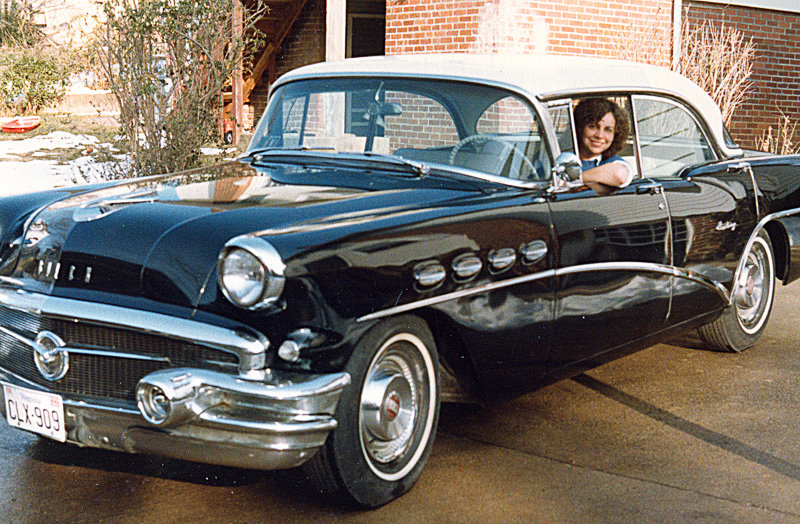
[Our fabled 1956 Buick. I gave it to Sylvia for her fortieth birthday…bought it from a local guy for $200.]
At this point, we take a lunch break. Rucker drives across town in his 1956 Buick, to a sleazy bar and grill where the teenage waitress chews gum and the house specialty is liver and onions on fried bread for $2.95. He seems absolutely at home here, drinking beer with truck drivers and auto mechanics — as far from the stereotypical image of a mathematician as it is possible to be. His working life, also, seems somehow out of character for an unreconstructed, laid back sixties radical. He does a regular nine-to-five stint at his improvised office, five days a week, before going home to his- children and his wife, who teaches at a local school.
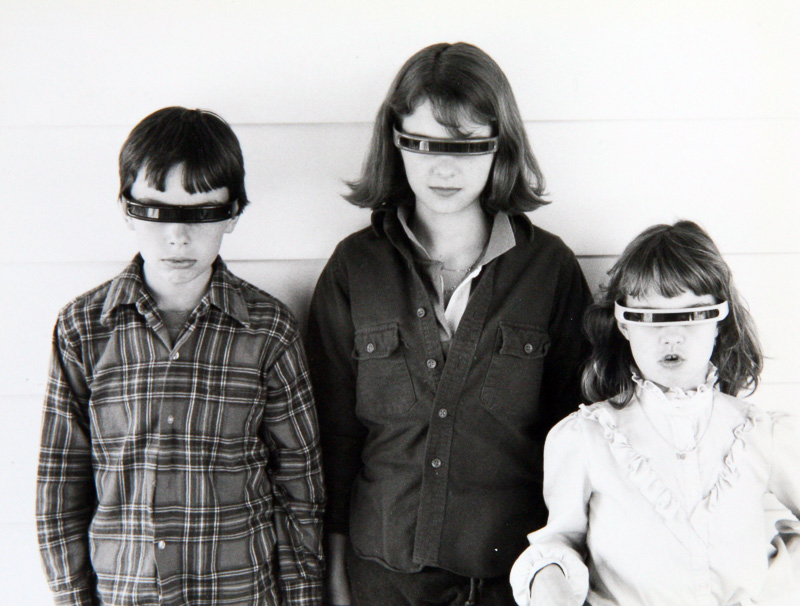
[Our three kids with cyber shades.]
“It does often bother people that the different parts of my personality seem not to add up,” he says. “I’ve always talked much more radically than anybody else, but when it came down to it, I was the only one who was thoroughly suckered into doing what I was programmed to do: go to college, get married, go to graduate school, have children, get a job. I even go to church a couple times a month. But my wife is definitely a stabilizing influence. Having a family life gives me a base from which to work. In a sense you could say it’s really plastic to be divorced and go through all that shit. Apparently, staying married is an act of rebellion.”

[I’ve carried this big metal railroad-car spring with me since I found it in 1968.]
Platt Links:
Dream Makers Volume 1 and Volume 2 are both out of print, but available. Each of them includes, I believe 28 authors. The new Dream Makers Collected Edition has 20 authors picked from volumes 1 & 2, and has the virtue of being in print, and is in Kindle as well as paperback.
See also the two volumes of Platt’s fascinating memoirs, An Accidental Life, paperback only, but less than $5 each, Volume 1 and Volume 2.
In recent years, much of Platt’s income has come from writing do-it-yourself books about making electronics projects.









May 9th, 2020 at 6:00 pm
Cool pics!
May 10th, 2020 at 2:07 pm
Love this story! Sadly, you don’t get more press. It feels very much like you. Time to start that religion!) I’ll join!:-)
May 20th, 2020 at 9:08 am
Be bourgeois and square in your material life so you can be radical and gnarly in your spiritual life. That way the Ringwraiths can’t find you.